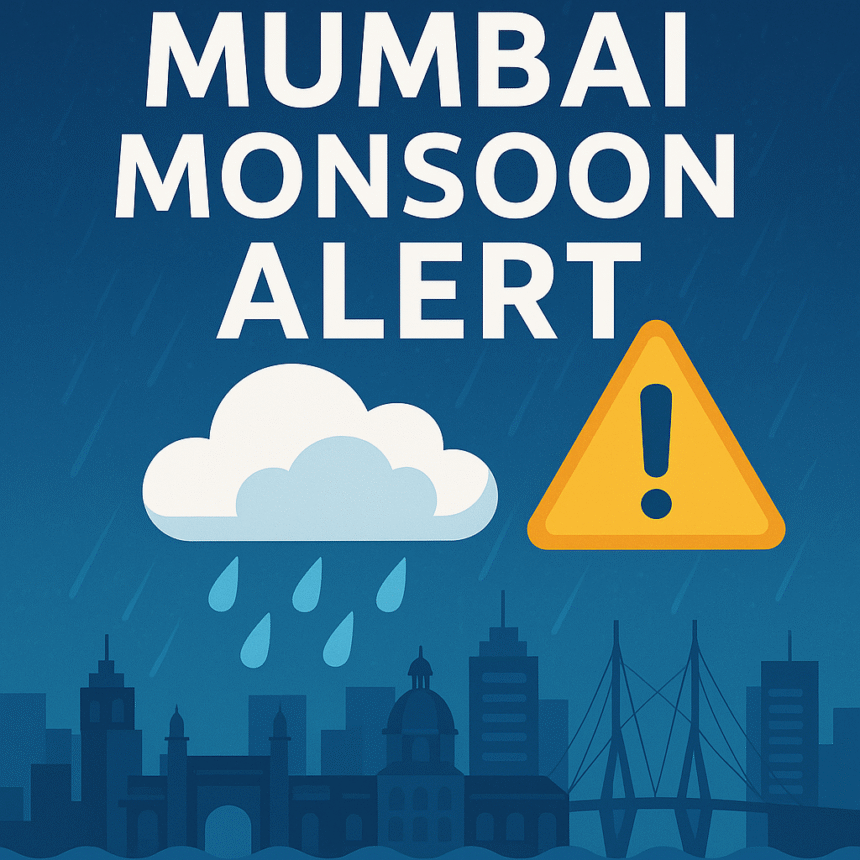Mumbai, July 26, 2025 – Mumbai Monsoon Alert : As Mumbai continues to reel under heavy monsoon rains this week, concerns over the city’s environmental stability have grown louder. From excessive rainfall causing urban flooding to increasing concerns about the city’s air quality and waterlogging crisis, Mumbai is experiencing the compounded effects of rapid urbanization and climate change in real time.
🌧️ Unrelenting Monsoon: A Crisis in Motion
This year’s monsoon has brought higher-than-average rainfall, with the India Meteorological Department (IMD) recording 428 mm rainfall in just 48 hours. Low-lying areas like Kurla, Sion, and Andheri East have been submerged, leaving thousands stranded.
Experts from IIT Bombay’s Environment Research Cell say this level of intense rainfall—occurring within such short intervals—is a clear sign of climate intensification.
“Mumbai’s infrastructure is not designed to handle this kind of rainfall. The drainage systems are outdated and overburdened,” says Dr. Priya Nair, an urban planner and climate resilience expert.
🏙️ Urban Sprawl Meets Natural Limits
Mumbai’s rapid vertical growth and uncontrolled real estate development have disrupted natural water flows. According to the 2025 Urban Expansion Index, over 23% of Mumbai’s natural green cover has been lost in the last 15 years, primarily due to commercial development and unauthorized constructions.
This is especially evident in the Mithi River region, where encroachments have led to narrowed channels and choking of water flow—contributing directly to floods.
💨 Air Quality Deterioration: Not Just a Winter Problem
While air pollution in Mumbai is typically associated with the winter smog season, 2025 has already seen PM2.5 levels rise by 38% during summer and monsoon months compared to last year.
The culprit? A mix of increased vehicular emissions, ongoing construction activity even during rains, and low wind speeds that fail to disperse pollutants.
Residents from areas like Malad, Bhandup, and Navi Mumbai have reported an increase in breathing discomfort and skin allergies—symptoms commonly linked to poor air quality.
🚧 Infrastructure Projects: Boon or Environmental Bane?
Large-scale infrastructure projects like the Mumbai Metro, Coastal Road, and Navi Mumbai International Airport are aimed at improving connectivity—but they come with environmental costs.
While the Mumbai Coastal Road Project promises to ease traffic, critics say it has resulted in the destruction of over 81 hectares of coastal ecosystem, impacting marine biodiversity and wave patterns.
Environmental activists continue to press for a balance between development and ecological sustainability, but enforcement remains weak.
🌱 The Role of Citizens & Tech in Resilience
In the face of administrative delays, Mumbaikars have started turning to community-driven weather alerts, local flood-mapping apps, and citizen data-sharing platforms to survive daily climate uncertainties.
Apps like RainTrack Mumbai and SaafHawa are seeing over 200,000 downloads, indicating a massive shift towards self-awareness and real-time reporting.
Moreover, local NGOs are working to plant urban forests in neighborhoods such as Goregaon and Chembur—hoping to revive lost green cover over time.
📉 What Needs to Change
Urban environmentalist and policy strategist Raghav Chitre says that Mumbai needs a climate resilience master plan that goes beyond patchwork solutions.
Some of his recommendations include:
- Climate risk assessments for every new real estate project
- Dynamic floodplain zoning
- Seasonal air quality audits at ward level
- Reviving and protecting wetlands like the Mahul Creek and Sewri Mudflats
📊 Data Snapshot (July 2025):
| Parameter | Value | Status |
|---|---|---|
| Avg. Rainfall (Jul) | 1234 mm | +18% above normal |
| PM2.5 Levels | 96 µg/m³ | Poor |
| Green Cover Loss (10 yrs) | 23% | Critical |
| Waterlogging Complaints (this week) | 2,650+ | High |
🌍 Mumbai’s Environmental Future: Urgent But Not Hopeless
While the numbers look grim, experts agree that Mumbai still has a chance—if policy, people, and technology work in sync. The city needs proactive governance, not reactive damage control.
As the monsoon season continues, the hope lies not just in better weather forecasts, but in better planning and bold decisions.
Mumbai Monsoon Alert, Mumbai Monsoon Alert, Mumbai Monsoon Alert, Mumbai Monsoon Alert, Mumbai Monsoon Alert, Mumbai Monsoon Alert,
“Exciting News! Sejal News Network is now on WhatsApp Channels
Subscribe today by clicking the link and stay updated with the latest news!” Click Here
Our App : Click Here



